Men's mental health: Unspoken stories of the masculine mental minefield
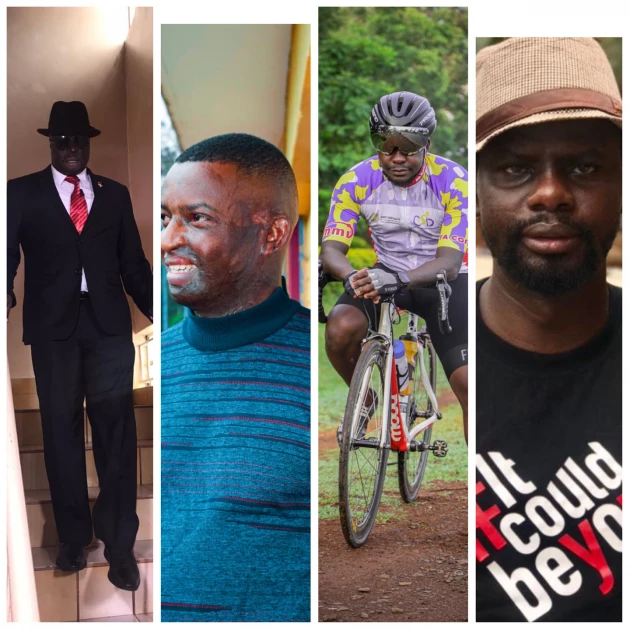
Dan Matakayia, Ben Asin, Kelvin Kairu and Philip Ogola./COURTESY

Audio By Vocalize
However, illness has often been viewed from the aspect of physical malady.
But what about when the mind is unwell?
According to the World Health Organization (WHO), one in every eight people, or 970 million people around the world were living with a mental disorder as of 2019, with anxiety and depressive disorders the most common.
In 2020, the number of people living with anxiety and depressive disorders rose significantly because of the COVID-19 pandemic, WHO states.
In Kenya, mental illness is still frowned upon, with many speaking of it in hushed tones and many of those who live through it suffer a silent torture.
The situation becomes worse when it is a man who is facing a mental illness. Statements like: “men don’t cry” and “a man has to be strong” are often used when referring to society’s expectation that men should be stoic in the face of adversity.
So shunned is mental illness, that some of those whose lives have been claimed by it have been given send offs devoid of dignity, as if they were pariahs.
Some have altogether refused to acknowledge mental illness as a sickness and resorted to spiritual rationalisations - think demon possession or generational curses.
All these factors come together to form an explosive combination that relegates the mental health agenda to the back burner.
A Kenya National Bureau of Statistics (KNBS) report released in November last year showed that more Kenyan men than women have mental disorders.
The report put together figures on the status of women and men in Kenya around 12 thematic areas, including health. The specific figures on chronic illnesses – including mental disorders – were extracted from Kenya Household and Health Expenditure and Utilisation Survey (KHHEUS), 2018.
`According to the “Women and Men in Kenya, Facts and Figures, 2022” report, which listed 14 chronic health conditions, 43.1 per cent of women were suffering from mental disorders as compared to 56.9 per cent of men. The age groups with the highest number of cases of mental disorders were 15-19 years (12.9 per cent); 20-24 years (9.7 per cent), 25-29 years (9.5 per cent) and 30-34 years (8.6 per cent).
Ride to the top, only to fall down
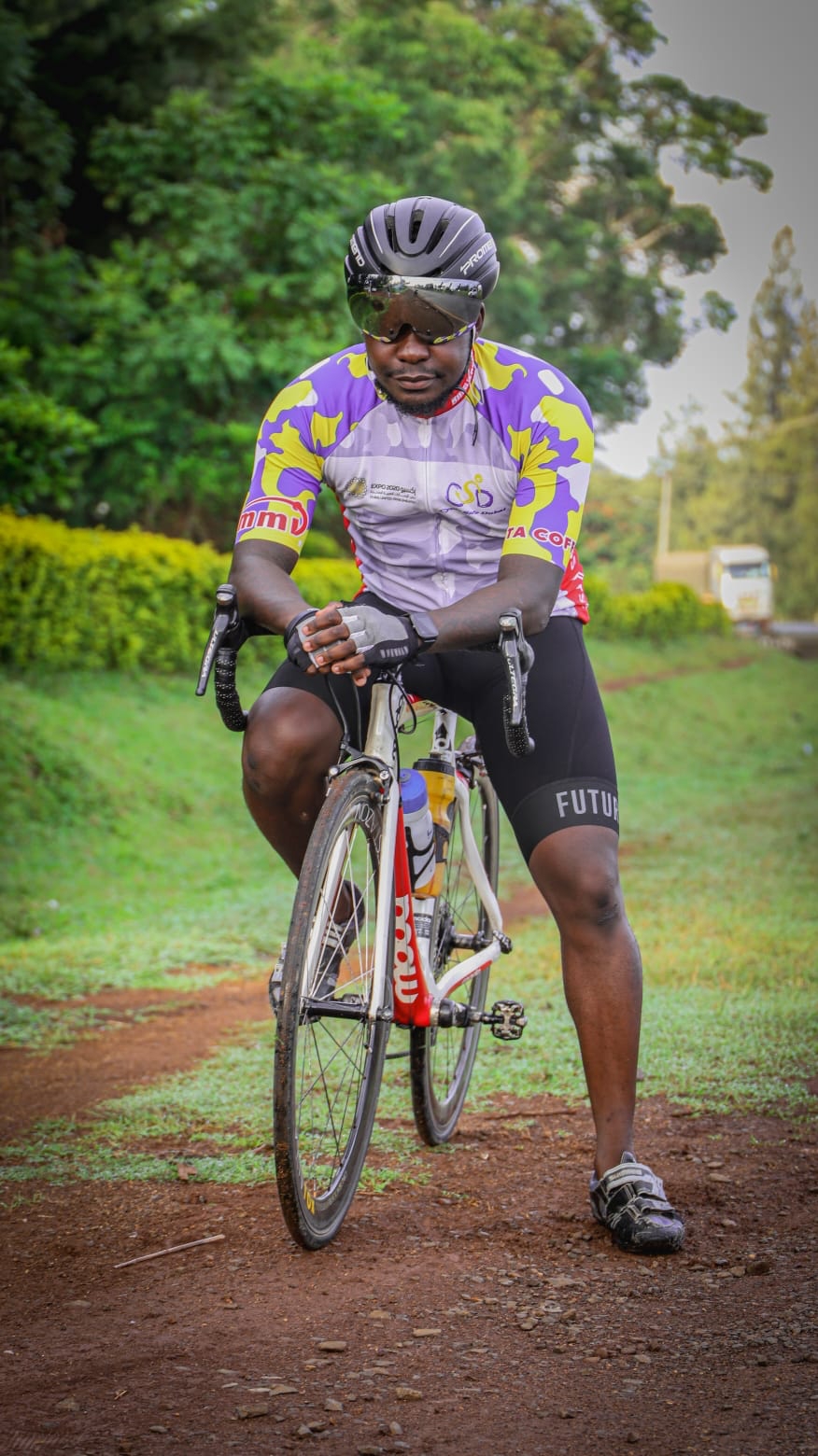
Meet Ben Asin ; a 29-year-old man who often takes a break from his work desk to go to the bathroom and have a good cry as he thinks of how life seems to have done a number on him.
He experienced the fast rise of a venture which helped prevent him from relapsing into alcoholism, and then an equally fast and spectacular collapse which forced him to make his way back to an organization where he had done his attachment, only that now, he was coming back much older – almost 30 – and not to take up a job, but to do an internship.
Asin ’s battle with depression and alcoholism started after graduating from the Catholic University of Eastern Africa (CUEA), where he undertook a degree in development studies. The year was 2017, and he had completed his 3-month compulsory attachment required for him to graduate.
It seemed like the world was his oyster and he set about relaxing from years of study as he pondered his next move – perhaps a good job with an NGO, perhaps in a different organization doing development work.
However, as he made applications for internships and jobs, nothing seemed to be forthcoming. “I didn’t think too much about it because I was still fresh out of campus and my friends and I would hang out, go for drinks and enjoy life. However, one by one, my friends started getting internship and job opportunities and I was the only one left at the bar table as they went ahead with life.”
This is when Asin fell into depression.
Asin had been sold false hopes and was back to square one – no internship and no job. He then retreated to the place he thought offered comfort – the bar – and the drinking continued.
As his drinking continued, his relationship with his family and girlfriend became strained and one day when he returned home from a night out drinking and woke up the next day to find his whole family gathered for an intervention.
“I felt betrayed because I had told my brother that I had drank a bit too much, but I didn’t think it was a situation that warranted an intervention where I was made to feel like I would amount to nothing.”
The family decided he should be shipped to his parents’ home in Kisumu – maybe he would sober up there and try and make something out of himself.
The anger from the decision still stings Asin as evidenced by his facial expression. Clad in an orange shirt, tie with clip and official trousers, as well as a smart watch, you’d be forgiven for thinking he was a full-time employee on a decent salary, not an intern. It’s easy to see how much it must take for him to share that he often has to go to the bathroom to cry as he thinks about how life is turning out.
“My internship ends in a week and I don’t know what I’ll do thereafter. Even getting this position was my lowest point. I had done my attachment here back when I was at CUEA, and when things fell apart, I came back to this office and cried in front of the secretary asking for a job – any job.”
But before it got to this, we flash back to Kisumu. Asin says he stayed with his parents for about a month, after which he said he was ready to return to the Capital City and try and make something out of himself.
“I was determined to show that I was not a failure and when I returned, one of my first ports of call was to my former girlfriend’s house in Komarock (she had dumped him after his constant struggles with alcohol).”
Being broke and not wanting to give his family more arsenal to prove why he should have stayed upcountry, Asin resorted to using a bike to cycle to Komarock in the hope of winning back his former girlfriend’s love.
“It didn’t work. I had gone in a pair of sandals, jeans and tried to explain why we should be together, but she would hear none of it.”
Asin cycled his way to a nearby petrol station and cried.
Thereafter, he took his bike and with a rush of adrenalin, channeled all his frustration on the bike and rode as fast as he could.
“By the time I was reaching home, I realized something – I felt better.”
There was something cathartic about cycling and fast at that.
That marked Asin ’s forays into the world of cycling.
Before he knew it, he was cycling every day of the week – Monday to Monday.
Asin said his family raised concerns about what they felt was him being overzealous about his newfound cycling passion, adding that he was spending too much time on it. However, Asin did not pay any mind to it and continued.
With a group of friends, they would cycle down the streets of Nairobi, then to Thika, then to Kajiado, then they got the idea to cycle to Mombasa, almost 500kms.
“By the time I told my cycling partners that we should cycle to Mombasa, we had become relatively known. I felt cycling was something I could use to help others the way it had helped me. I had a place to channel my adrenalin in a positive way and I told my cycling partners that we should make something out of this.”
By this time, Asin had upgraded his bicycle from a mountain bike, which he had borrowed from his brother, to a road bike – which set him and his father back by Ksh.100,000.
“I had watched a lot of YouTube videos and learnt a lot about cycling gear and bikes and my father was more than happy to chip in if it meant me keeping away from alcohol.”
Asin said he and his crew got so engrossed in cycling that they would take under two hours to cycle to Thika from Nairobi. “The adrenalin made us do it and I wasn’t afraid of cars on the road.”
One of Asin ’s brothers took interest in his newfound passion for cycling and didn’t believe he and his friends could take under two hours to get to Thika, so he followed them – in a car - during one of their escapades and what he saw impressed him.
“He said: ‘You guys are the kings of spinning’. And that is how the group’s name came about – Spin Kings Kenya.”
When the crew decided to take on the challenge of cycling to Mombasa in 2020 during the height of the COVID-19 pandemic, they got the attention of the county government.
“By this time the Spin Kings Kenya was getting popular online and a member of staff at the Mombasa County government heard about our planned cycle to the county and reached out to me.”
Then Governor Hassan Joho was there to receive the group when they arrived in Mombasa, and then Deputy Governor, William Kingi, joined them for a cycle around the town. This made the group’s popularity rise even further.
“This was the time when COVID-19 had just hit the country and a lot of people were at home and online a lot, so they encountered our content because whenever we did a cycling challenge, we would put it online.”
The group cycled to Mombasa from Nairobi in just under two days, making a stop at Voi to sleep and then proceeded to Mombasa – more than 400km in total.
Things were looking up for Asin, who had now decided to completely focus on cycling rather than keep looking for an eight-to-five job. He wanted to make a living off it and at the same time make an impact in other people’s lives as exercise – in whichever form, is said to have a good impact on not only one’s physical health, but mental as well.
A short while later, the Office of the Deputy President came calling – then Second Lady, Rachel Ruto, took notice of Spin Kings Kenya and congratulated them on their work in a Twitter reply to a post the group had made after a Sunday cycle session. The tweet read, “Will join you one of these days God willing. Very proud of your team. Keep going.”
“At first, we wondered if it was a parody account, but realised it was really her account. But I decided not to reach out just yet. I thought to myself – chema chajiuza.. (good work speaks for itself).”
Asin says not long after, he received a call from the Office of the Deputy President and he and his crew were invited to meet Mrs Ruto.
“I was in awe. She was very pleasant and expressed interest in what we were doing in the cycling arena.”
Asin says he and his crew trained Mrs Ruto and her team for a while and contributed to ideas that led to the formation of the ‘Mama Cycling’ association. According to the association’s Twitter page, Mama Cycling is a “registered association that brings together cyclists and cycling enthusiasts to promote healthy communities through cycling.”

Asin says, “I really felt like all my efforts were beginning to bear fruit.”
He then decided to make good use of the rapport he had formed.
“I knew that Spin Kings may not last forever. We started during the COVID-19 period, when many people just wanted a reason to get out and we knew one day it might not be sustainable when life got back to normal.”
It is this realization that made him ask for a job.
Asin said he continued with his cycling adventures with the hopes that he would transition to a new job soon, but time passed.
Kenya had a General Election in August 2022 and the regime changed and the Second Lady became the First Lady.
However, Asin says he did not get a job offer as he had hoped.
Worse still, there began to be wrangles within the Spin Kings Kenya group, with some branching out to form their own factions, others dropping out as other opportunities came calling and others fighting for control.
“This made me sink into depression again and relapse. I often go the bathroom and cry when I think how much I put in, building this (Spin Kings), only for it to come to this.”
In the second week of January 2023, Asin made the hard decision to fold up the Spin Kings Kenya group as he ponders his next move. This, as his internship comes to a close.
“I’m struggling. I don’t want to relapse but depression is taking its toll on me,” he says.
Psychologist Grace Nyambura says that life’s pressures can sometimes push one into overdoing activities.
“There is high functioning depression where someone absorbs themselves into activities as a way to avoid dealing with a difficult situation. For some, they become workaholics.”
This might explain why Asin was so focused on cycling Monday to Monday.
Nyambura continues, “Men have to learn how to take breaks. Some develop work addiction and will work from early morning to midnight as a way of not dealing with a problem. One needs to develop healthy boundaries and not avoid dealing with your emotions.”
“Men like to feel stimulated, that’s why some enjoy being in the gym or engaging in other exercise,” she says.
“Toxic masculinity is behind men being told not to express their feelings. They will be asked why they are crying. It is true that ego is important to a man, but there are other coping mechanisms (rather than bottling up feelings).”
Disfigured face and child loss
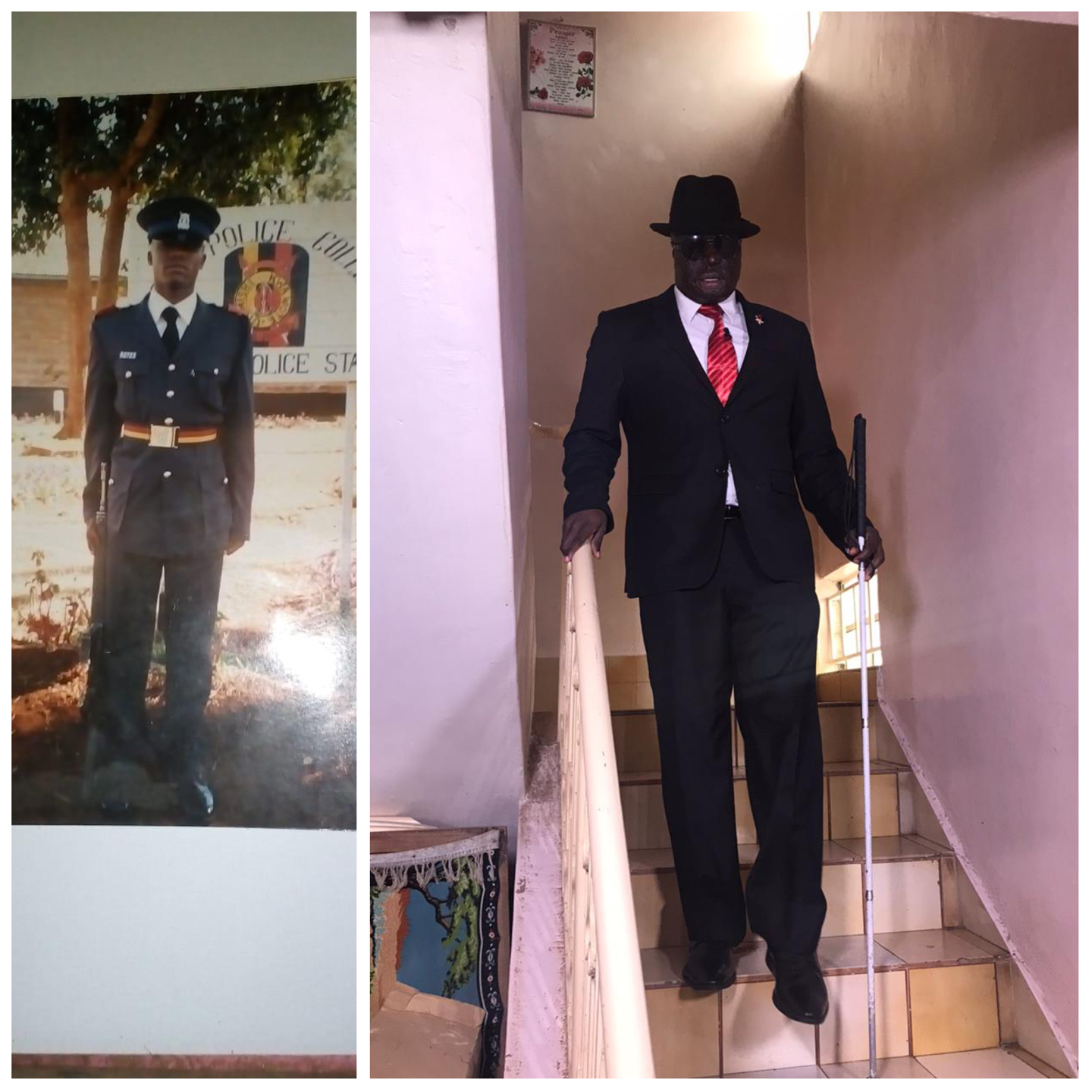
It is often said that you are one tragedy away from suffering from a mental illness.
If there is a person who knows just how cruel life can be, it is Danson Matakayia.
His was supposed to have a bright future. He got married at 23, was blessed with a son at 24 and was starting his career in the police service.
However, Murphy’s law - anything that can go wrong, will go wrong - made a statistic out of him. When the rain started to pour in his life, it didn’t seem to stop.
It started with the death of his child at nine months of age. Then a strained marriage followed, which culminated in a rude awakening one night in September 2013 from a burning substance – sulphuric acid – poured all over his face. The attack disfigured Matakayia’s face and left him partially blind. What followed was 15 reconstructive surgeries – all in a bid to rescue what could be of Matakayia’s face. Some failed, other surgeries did help, a little bit, but the overall verdict by the doctors was that his eyesight could not be restored.
“Sometimes I wake up feeling very low and regret (being here). I think about how my life might have been had I not lost my sight and I feel so bad,” Matakayia says.
It has been 10 years since the incident, and Matakayia is still trying to pick the pieces in his life. "I live a day at a time," he says.
To understand Matakayia’s story, we need to go back to 2013, when he was a police officer, serving in Kisii town. He and his wife had been married for two years and were still mourning the death of their son, who had died a year earlier from meningitis and pneumonia.
“The death took a toll on our marriage and my wife wanted us to get another child immediately to ‘heal’. She said her friends had advised her that the best way to heal from child loss was to get another child, quickly. But I was not for the idea, at all. First, I hadn’t yet healed from our son’s painful death, and secondly, I didn’t think it was the place of outsiders to start telling us what to do as a family.”
Matakayia said that his wife went for counselling, but he declined to do so, because at the time, he didn’t see the value in it – after all, it wouldn’t bring his child back to life.
Matakayia says he and his wife had always lived apart due to work obligations, and it is during the weekends either of them would make the commute between Kisii and Mwea to spend time together. However, after the loss of their child, his wife changed jobs and focused on a family business that was based in Nakuru.
This made his weekly commutes shorter. However, the weight of child loss began to take a heavy toll on their marriage and during one of her weekend visits, Matakayia's wife told him that she wanted to move some of the couple’s things (including baby items they still had) to her house in Nakuru.
“I was reluctant because living within police housing, I felt it would paint the wrong picture if my colleagues saw her moving items from the house and I didn’t want people at work talking about my personal issues. I also felt that her carrying items would delay her healing because she would look at them and remember our son,” he said.
Matakayia said his wife did not protest. “That was one of the reasons why I had fallen in love with her. She was not quarrelsome and she was calm in all situations. I didn’t think things would go wrong,” he said.
Fast forward to one weekend when she was at their Kisii home and Matakayia said he returned home from night shift at around 5:30am and went to sleep.
“I was fast asleep when I was woken up by a hot liquid that had been poured on my face. I tried to gather my senses and run to the bathroom to pour water to cool my face but when I stepped on the floor, I felt my feet get numb – the floor was wet and an electricity cable had been put on the floor.”
Matakayia says his now former wife fled but turned herself in to the police two days later. He says she was released on bond and the case is yet to be concluded, 10 years later. Moreover, Matakayia claims she is nowhere to be found.
“I have been asked by her family members and others to drop the case, but I want the law to take its course. I have forgiven, but the law should take its course,” he says.
Matakayia spent about five months admitted in hospital as doctors tried to help him recuperate. A total of 15 surgeries down the line, some successful, others not so much, doctors grafted other parts of his body to try and reconstruct his face but there was one damning verdict that was delivered to him, “We cannot save your sight.”
“That was the most devastating statement to me, because in spite of the burns, I had hoped my sight could at least be restored,” he said.
The prognosis threw Matakayia into depression and it is at this point that he started having suicidal ideations, which he tried to actualise.
“I was at a ward bed near a window and it didn’t have grills, so I thought it would be better for me to throw myself down from the ninth floor and end my misery.”
As Matakayia contemplated executing his plan, fear started to grip him as he thought of the consequences should his attempt fail. “I thought – what if I don’t die after jumping from so high? What condition will my body be left in?”
After chickening out, he pondered his next move.
It is said, that no matter how bad you have it in life, it could get worse; there could be someone else who has it worse or maybe, just maybe, it could get better.
When having a conversation with his ward mate, Matakayia opened up about how he had given up hope in life and didn’t see the need of living.
“What he told me made me change my outlook. He told me he wished he was in my shoes; that at least I was going to be able to leave the hospital and live. For him, he was in the final stages of leukaemia and was just waiting to die”
This gave Matakayia a push to fight to live.
“It’s not easy. There are days I wake up so low and I wonder what the worth of life is, but I have to keep on moving.”
Matakayia has since been transferred to Industrial Area police station as his work station. After the incident, he decided to pursue a course in counselling psychology as a way to first help himself come to terms with his new life and also help others dealing with trauma of different kinds.
He also took on a course in braille.
On relationships, Matakayia says he is slowly learning to open up after a few false starts.
“At first I was very against relationships. I didn’t want anything to do with women, but I’m slowly learning to open up again and with the course in psychology, I have learnt how the mind works and warning signs to look out for. I’m 35 now and I know when the time is right, things will fall into place.”
For now, Matakayia continues to take one day at a time. Some days are better than others, and some days he simply has to force himself to wake up and face the world.
Psychologist Nyambura says that the experience Matakayia went through might have made him suffer from body dysmorphia.
Body dysmorphia is a mental health condition where a person spends a lot of time worrying about flaws in their appearance.
“A traumatic experience alters how you think and view yourself. When you start having doubts about yourself based on the way you look, you can start to have low self-esteem,” Nyambura says.
She says many times someone close to the victim can further erode the person’s esteem based on what they tell them.
'Too ugly for camera'
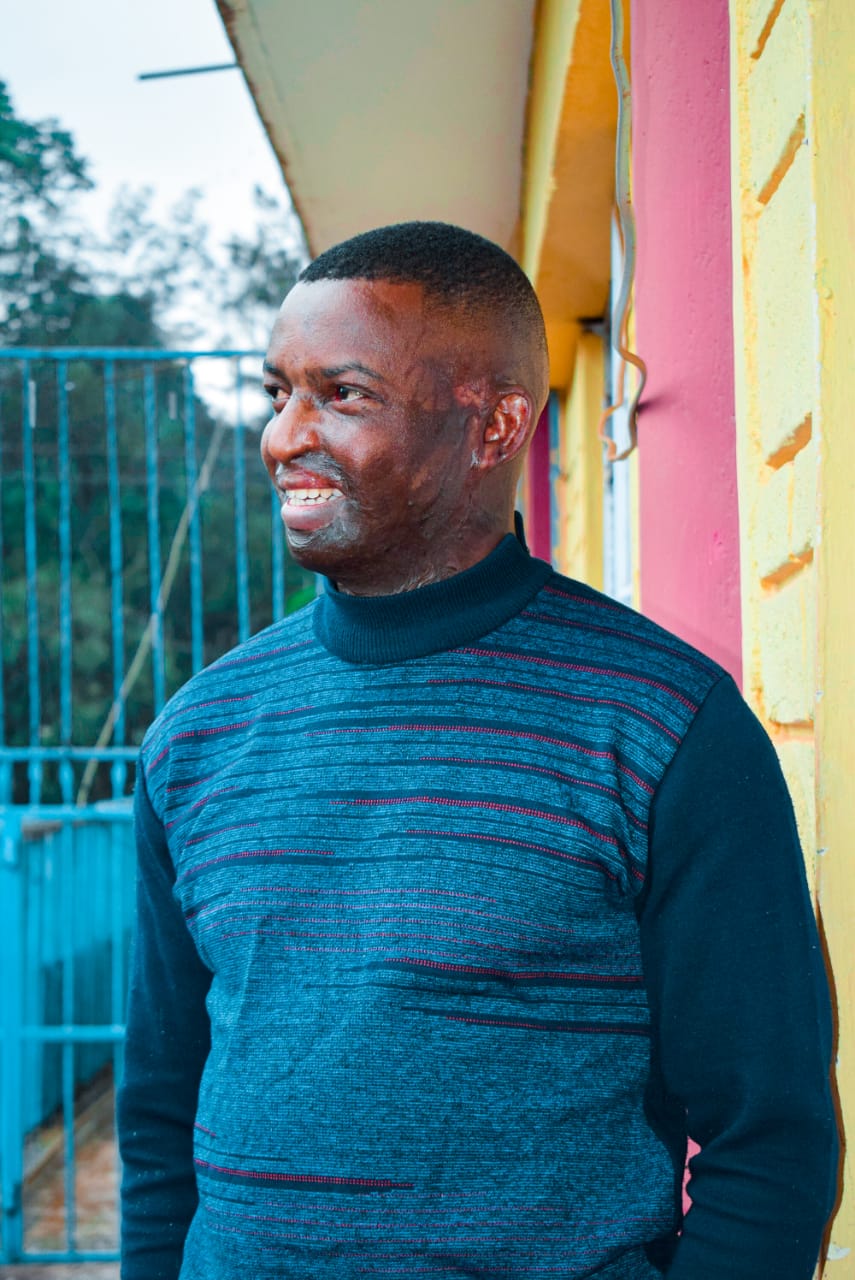
Kilometres away in Witeithie is another acid attack survivor, who is trying to look for the positives in a life that was forever changed in 2018.
Meet Kelvin Kairu, 30, a man who was at the time working as an instructor at a security company when an acid attack changed the trajectory of his life.
It’s one thing for strangers, and even friends, to kick you when you’re already down, but it’s an entirely different thing when jabs and stabs come from a family member.
For Kairu, a comment that he was too ugly to be seen in front of cameras and another suggesting that his life was not worth much because the burn attack left his face disfigured, pushed him to attempt to end it all, not once, but twice.
Kairu has since moved out of the dark place in his life, however, before he got to that point, it took a lot of time - some spent at Mathare Hospital undergoing counselling and some just speaking to himself about his worth, call it self affirmation.
Kairu’s attack happened in 2018.
It happened one morning around 5am when he was living in Nanyuki and was headed to work.
“I was ambushed by a stranger, who accosted me, poured a liquid on my face and fled. Because it was still dark, I didn’t realise it was acid but I felt a burn and I rushed towards a street light and I realized it was sulphuric acid as part of my flesh had come off and my clothes had been burnt.”
Kairu says he did not recognise the assailant and to this day, he does not know the motive.
“That’s what really hurts me. I don’t understand why a stranger attacked me. Why me?”
What followed was a slump into depression as Kairu underwent four reconstructive surgeries.
He initially received treatment in Nanyuki, then was referred to a hospital in Kiambu, then finally Kenyatta National Hospital (KNH) in Nairobi.
One of the struggles Kairu said he had to face was explaining to his two children, who were under five at the time, that, “It’s me, your father.”
It took a while for them to recognise him after the attack.
“They used to avoid me initially, but I had to sit them down and explain to them that it was still me, their father. I explained to them that if they did not want to look like me, they had to make sure they didn’t play with fire and gas and other dangerous things,” Kairu says.
“The good thing is that my children took things positively.”
Kairu now has three children aged nine, six and three, and credits his wife for standing by him during the tough transition to his new life.
“We have been together for 10 years and she has been supportive all through. She stood by me, even when close relatives had written me off,” he says.
Despite the good support system, Kairu reveals that he suffered alone for a long time and did not feel comfortable sharing his struggle to accept his new life with his wife, which led to him attempting to take his life.
“As much as she is supportive, I felt alone and I didn’t feel like she would understand that I hated myself, so I just kept it all to myself and tried to take my life twice in 2019.”
Both attempts failed, however, in the last attempt, Kairu said he was vulnerable and went to social media and revealed that he was tired of life. He credits two friends who noticed things were amiss for tracing and rescuing him.
Kairu was then checked in to Mathare Hospital, where he underwent a detox and counselling.
Kairu, who now works within the media industry, says he is in a better place, but the mental health journey is one to be taken one day at a time.
“I advise people who are going through mental health problems to avoid being idle, because that is when bad thoughts can start to consume the mind and push you to do something bad. It’s important to learn to accept yourself, because once you do, no one can do anything against you.”
Kairu turns to walking and listening to gospel music as a means of keeping his moods up when he is feeling low.
“There’s this song by Mary Lincoln which talks about not envying the life of someone else. That song speaks to me,” he says.
Kairu says there is more that needs to be done to make people more empathetic to the struggles people with mental illness face.
“Many people rejoice in seeing people go through tragedies. But it’s important for people to remember, that as much as this (attack) happened to me, tomorrow, it could be you in a similar, or worse situation. There are people who take other people’s tragedies as fodder to ridicule them.”
He continues, “If you see someone going to social media to post something that borders on the lines of them giving up, that is not the time to put them down further. I’ve seen people comment on people’s posts who talk about giving up on life, saying things like, ‘go ahead and we will come (to your funeral) to feast on rice and other food’.”
On self-acceptance, Kairu says, “I have learnt that people can only use your weakness against you when you have not accepted yourself. When you accept yourself, no one can put you down.”
Psychologist Grace Nyambura says that men do not always have a problem opening up, but they do sometimes avoid opening up to women, especially spouses, because of ego and fear that they will be looked down upon.
“Sometimes a man fears that if he tells his wife what he is going through, she might think or ask him if he is man enough and this doesn’t help the situation. It’s ok for a man to speak out but what they consider as safe spaces is different from women. For some men, the gym is a good outlet, for others it’s meeting with their ‘boys’ or taking a long drive,” she says.
Childhood trauma
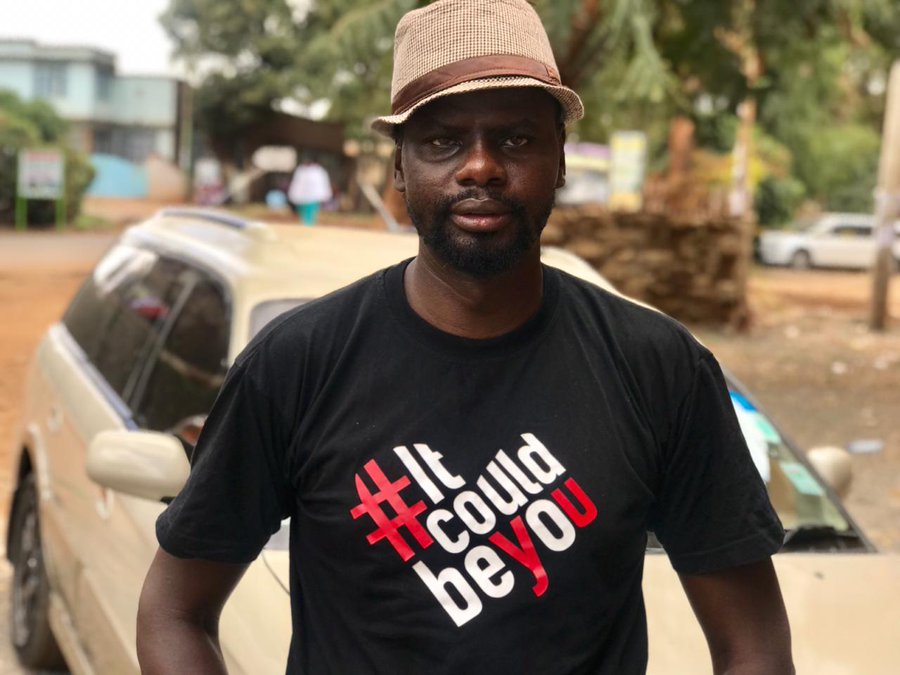
In the case of Philip Ogola, he points his struggles with mental illness to unresolved childhood trauma.
“I’m just a 46-year-old boy. It’s not until I dealt with my childhood trauma that I was able to heal,” he says.
Ogola, a mental health advocate, tells of how he was defiled by his nanny for three years from when he was nine years old.
“My mother used to go upcountry a lot and my father was a policeman who was mostly at home during the weekends,” he says.
With Ogola’s older siblings in boarding school, his nanny was often left with him and abused the trust she was given to defile him.
“It’s important for every man to get in touch with the boy in him and address their childhood trauma. I had speech impairment and people would make fun of me. As a child, I learnt to hide my feelings and became an introvert.”
Ogola has previously checked himself into Mathare National Teaching and Referral Hospital when he felt his mental health was in a poor state.
“We should normalize going for therapy,” he says.
Ogola says that being someone on the neurodivergent spectrum has meant many people, including some of his family members, do not quite understand him.
Neurodivergent describes people whose brain differences affect how their brain works, according to Clevelandclinic.org. That means they have different strengths and challenges from people whose brains don't have those differences. The possible differences include medical disorders, learning disabilities and other conditions.
Ogola urges parents and caregivers to be friends with their children to understand what they might be going through.
“Is your house a safe space for your child to open up to you?”
“Couples should also go for testing (before getting married) to find out if they have genetic disorders that might affect their children (in the future).”
Ogola says that although he is misunderstood, he doesn’t blame anyone.
“There’s societal ignorance on how to deal with neurodivergent disorders. Many kids who have them are misunderstood. For parents with children on the neurodivergent spectrum, you should go for therapy. It should be normalised."
Ogola reiterates that the days that therapy was as being taboo are over.
“When I was growing up, it was almost an abomination to say you were going for therapy, but this generation - the Gen Zs and Gena Alphas – understand its importance.”
He says many men don't speak out about the problems they face because of fear of being regarded as weak.
“A man who opens up or cries can be told to ‘wacha umama’ (stop ‘girl-like’ behavior). Men need a safe space to be vulnerable.”
Ogola says that when it comes to dealing with mental illness, it’s important to accept and love oneself first to be able to cope well.
“Acceptance is important. There are people who are people pleasers. Once you accept yourself, no shaming will bother you.”
On the state of mental health in Kenya, Ogola says more data needs to be collected and made available.
“Mental health practitioners need to have a central repository where one can find data on how many men go for therapy and what are the triggers. We just see a rise in mental health illnesses and suicides, but we don’t know the reasons. We also need to know how many men and women are going for therapy, the number of kids too. We also have to document success stories as a country.”
While Kenya has made some progress when it comes to mental health legislation, more still needs to be done.
In June last year, then President Uhuru Kenyatta signed into law the Mental Health Bill that aims to protect people with mental health conditions.
The law focuses on prevention and reducing the impact of disorders. It also seeks to govern the recovery, reintegration, and the safeguarding of rights of people with mental illnesses.
The law mandates both the national and county governments to provide the necessary resources for the provision of the mental health care and treatment. The 2022 Act amends the previous Mental Health Act, Cap 248.
What to do if you are going through a tough time or experiencing mental illness:
Nyambura says that there are healthy ways to cope with tough times and mental health illnesses rather than resorting to drugs, alcoholism and other harmful activities.
They include:
1. Exercise: This calms the nervous system and stimulates blood flow to enable you to process information properly
2. Have a social support system: This doesn't mean telling everyone everything you are going through. It's about having a trusted group of people you can open up to, because you sometimes don't know what you're feeling but know you're not feeling ok and a group of trusted friends can help you unpack what you are going through. Sometimes you don't know how hurt you are until you open up
3. Get a therapist to help unpack your emotions: Therapy is not just about healing. Sometimes all you need is for someone to listen and a therapist will do just that
4. Take care of your nutrition: What you eat affects your mood and how you feel about yourself. Make sure you eat a balanced diet and enough of the right fluids like water
5. Avoid drugs and alcohol: This is especially important when going through tough times as you can easily slip into drug and alcohol abuse. "You can tell yourself it's just one drink you’re having, but for how long will you deal with your situation using the bottle? Alcohol is a stimulant but also a depressant. That's why you sometimes find people having suicidal ideations after drinking too much.”
6. Learn how to take breaks. Don't have work addiction and learn how to draw healthy boundaries
7. Take part in activities that help manage stress. These include mindfulness and yoga
8. Get enough sleep and sometimes take a social media break
9. Educate yourself on what stress and mental illness is so that you can recognize if you are going through them


Leave a Comment